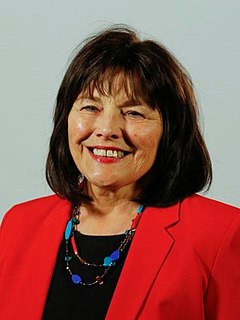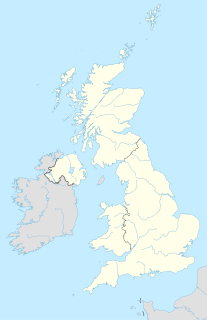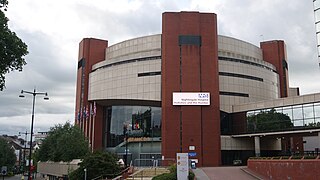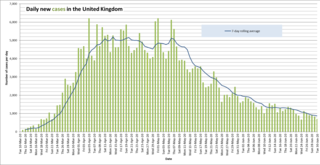
Elsie Maud Inglis was an innovative Scottish doctor, pioneering surgeon, inspiring teacher, suffragist, and founder of the Scottish Women's Hospitals, and the first woman to hold the Serbian Order of the White Eagle.

The SEC Centre is Scotland's largest exhibition centre, located in Glasgow, Scotland. It is one of the three main venues within the Scottish Event Campus.

Healthcare in Scotland is mainly provided by Scotland's public health service, NHS Scotland. It provides healthcare to all permanent residents free at the point of need and paid for from general taxation. Health is a matter that is devolved, and considerable differences have developed between the public healthcare systems in the countries of the United Kingdom. Though the public system dominates healthcare provision, private healthcare and a wide variety of alternative and complementary treatments are available for those willing and able to pay.

Louisa Jordan was a Scottish nurse who died in service during the First World War.

Jeane Tennent Freeman is a former Scottish politician who served as the Scottish Cabinet Secretary for Health and Sport from 2018 to 2021. A member of the Scottish National Party (SNP), she was the Member of the Scottish Parliament (MSP) for Carrick, Cumnock and Doon Valley from 2016 to 2021.

The COVID-19 pandemic in the United Kingdom is part of the worldwide pandemic of coronavirus disease 2019 caused by the SARS-CoV-2 virus. The virus reached the UK in late January 2020. As of 16 June 2021, there had been 4.6 million cases confirmed and 128,181 deaths overall among people who had recently tested positive – the world's nineteenth-highest death rate by population and the highest death toll in Europe. There have been 153,493 deaths where the death certificate mentioned COVID by 28 May 2021. There has been some disparity between the outbreak's severity in England, Scotland, Wales and Northern Ireland – health in the UK is devolved, with each of the four having its own publicly funded healthcare system and government.

The COVID-19 pandemic was first confirmed to have spread to Scotland on 1 March 2020 with the positive COVID-19 test of a male Tayside resident who had recently travelled between Scotland and northern Italy. The first reported case of community transmission was on 11 March 2020 and the first reported coronavirus death in Scotland was on 13 March 2020.
The first case relating to the ongoing COVID-19 pandemic in London, England, was confirmed on 12 February 2020 in a woman who had recently arrived from China. By mid-March, there had been almost 500 confirmed cases in the city, and 23 deaths; a month later, the number of deaths had topped 4,000.

Operation Rescript is the code name for the British military operation to help tackle the ongoing COVID-19 pandemic in the United Kingdom. It has been described as the UK's "biggest ever homeland military operation in peacetime" by the Ministry of Defence (MOD), involving up to 23,000 personnel within a specialist task force, named the COVID Support Force (CSF). The support is given at the request of the UK government, its devolved administrations and civil authorities through the Military aid to the civil authorities (MACA) mechanism.

The NHS Nightingale Hospital London is the first of the NHS Nightingale Hospitals: temporary hospitals set up by NHS England for the COVID-19 pandemic. It is housed in the ExCeL London convention centre in East London, and has an initial capacity for 500 patients, with potential for 4,000. The hospital was rapidly planned and constructed, being formally opened on 3 April and receiving its first patients on 7 April 2020.
Nightingale Hospital can mean:

The NHS Nightingale Hospital Birmingham is the second of the temporary NHS Nightingale Hospitals set up by NHS England to help to deal with the COVID-19 pandemic. It was constructed inside the National Exhibition Centre, Solihull, and opened on 16 April 2020.

The COVID-19 hospitalsin the United Kingdom are temporary hospitals set up in the United Kingdom and overseas territories as part of the response to the COVID-19 pandemic.

Dragon's Heart Hospital was a temporary hospital located at the Millennium Stadium in Cardiff. It opened on the 13th April 2020 to help deal with the impact of the COVID-19 pandemic in Wales. It was decommissioned towards the end of October and early November 2020.
In the early stages of the First World War, Serbia suffered an epidemic of typhus and relapsing fever.The epidemic first appeared in the late autumn of 1914, after the second Austrian offensive. By December the Austro-Hungarian troops were pushed out of Serbia for the second time in ten days. Around 50,000 wounded and sick remained in hospitals. Great problems with the lack of accommodation and food were affecting not only hospitals but the civilian population as well, besides that, there were around 50,000 Austro-Hungarian prisoners that had to be accommodated and fed too. Dr. Roman Sondermajer established a large field hospital near Kragujevac, using army barracks to care for the sick and wounded.

The NHS Nightingale Hospital North West is the third of the temporary NHS Nightingale Hospitals set up by NHS England in 2020 to help to deal with the COVID-19 pandemic.

The NHS Nightingale Hospital Yorkshire and the Humber is one of the temporary NHS Nightingale Hospitals set up by NHS England in 2020 to help to deal with the COVID-19 pandemic. The hospital was constructed inside the Harrogate Convention Centre, Harrogate, and from 4 June 2020 was repurposed as a radiology diagnostic clinic.

The following is a timeline of the COVID-19 pandemic in the United Kingdom from January 2020 to July 2020. There are significant differences in the legislation and the reporting between the countries of the UK: England, Scotland, Northern Ireland, and Wales. The numbers of cases and deaths are reported on a government Web site updated daily during the pandemic. The UK-wide COVID Symptom Study based on surveys of four million participants, endorsed by authorities in Scotland and Wales, run by health science company ZOE, and analysed by King's College London researchers, publishes daily estimates of the number of new and total current COVID-19 infections in UK regions, without restriction to only laboratory-confirmed cases.

The NHS Nightingale Hospital North East is one of the temporary NHS Nightingale Hospitals set up by NHS England to help to deal with the COVID-19 pandemic. It was constructed inside the Centre of Excellence for Sustainable Advanced Manufacturing, Sunderland.
The following is a timeline of the COVID-19 pandemic in Scotland during 2020. There are significant differences in the legislation and the reporting between the countries of the UK: England, Scotland, Northern Ireland, and Wales.



















